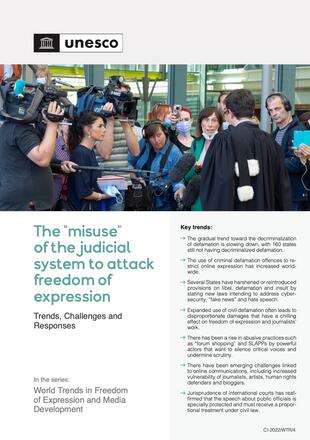
Defamation is defined as a “communication of a false statement that unjustly causes harm” to an individual’s reputation. In fact, defamation laws aim at safeguarding individuals’ reputation from false statements which might damage them. However, safeguarding someone’s reputation must always be balanced by the need to preserve freedom of expression.
Defamation can constitute a criminal offence or a civil proceeding. Most judicial systems in the world, comprise both natures. According to international law, freedom of expression should be criminally sanctioned only when aimed at incitement to hatred. Nevertheless, around the world the set of criminal offences that journalists are charged for include, among other, defamation, insulting public officials, sedition, attempts against public order, blasphemy, terrorism. Criminal defamation can be punished with fines and imprisonment. The use of criminal defamation offences to restrict freedom of expression has increased worldwide. A worrisome signal of such a trend is the fact that in 2021, 294 journalists were incarcerated.
The brief provides an overview of the jurisprudence and declarations of international and regional human rights courts, as well as monitoring bodies and UN agencies focused on the interpretation of defamation provisions. A theme which has emerged as globally relevant, the importance of granting strong protection to the right of expression in the context of public debates involving political figures and institutions. Specifically, the brief recalls the jurisprudence of the European Court of Human Rights, who in 1986 had issued a landmark decision. In Lingens v. Austria, the court argued that the freedom of political debate constitutes the core of democratic societies, thus politicians should tolerate higher levels of criticism. Similarly, in a 2014 ruling, the African Court on Human and People’s Rights argued that the sentence to imprisonment and a semester publication suspension for public insult and contempt of officials in the case Lohé Issa Konaté v. Burkina Faso, to be disproportionate. The court has confirmed that public officials should accept a greater degree of criticism compared to a private citizen. The Inter-American Court of Human Rights, has been crucial in advancing the agenda of the decriminalisation of laws targeting public officials’ honour.
Another legal tool often used to restrict freedom of expression is the abuse of civil defamation, which often produces disproportionate damage claims, attempting to bankrupt media outlets and journalists and generating a chilling effect on media professionals.
SLAPPs represent an abuse of a legal tool usually employed by powerful individuals to silence criticism. Their final goal is not winning the case, but rather overwhelm the defendant by claiming excessive remedies, stretching out the legal proceeding and creating a psychological burden.
Finally, the UNESCO brief includes a number of recommendations addressed to different actors: states, civil society, journalists. Among the recommendation listed by the author:
- States should abrogate criminal defamation and replace them by appropriate civil defamation provisions.
- States should carefully review provisions regarding themes such as fake news, cybersecurity and terrorism to avoid abusive restriction of freedom of speech.
- Public officials should not benefit from special protection and public bodies should not be allowed to file claims for defamation.
- Remedies should serve the aim of repair for the harm caused, not punish. Non pecuniary remedies should be preferred (apology, correction, reply) and a ceiling for maximum compensation should be set.
- Court decisions could benefit from the resort to the amicus curiae.
The content of this article can be used according to the terms of Creative Commons: Attribution-NonCommercial 4.0 International (CC BY-NC 4.0) . To do so use the the wording "this article was originally published on the Resource Centre on Media Freedom in Europe" including a direct active link to the original article page.

